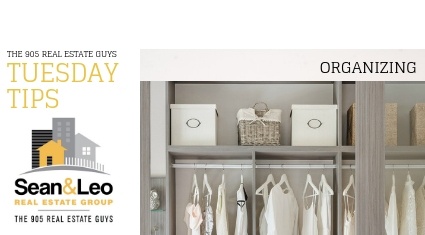We all have too much stuff! Decluttering and organizing takes time and can be hard work. If we don’t regularly let go of things, the abundance of stuff starts to slowly overcome us and we find ourselves getting overwhelmed by all of our possessions. To stay organized anywhere, be mindful of everything you bring in through your front door. Everything needs its own home – don’t bring it in unless you know exactly where it’s going to fit in your home. Here are a some ideas to get you on track to a more organized life.
Make your bed every morning
Your bed is the focal point in your bedroom, a made bed will make your whole room feel orderly and neat. This is a quick two minute task that can make all the difference in a room.
Dispose of expired medicines and toiletries
• Purge any expired products. Prescriptions and over-the-counter medications have expiration dates.
• Check dates and dispose of old makeup products every six months.
• Use clear acrylic makeup organizers that will hold your toiletries upright in your vanity.
• Use drawer organizers inside shallow bathroom drawers to separate cosmetics.
• Use apothecary jars to store small items like hair elastics, chapstick, Q-tips, and makeup applicators.
Closets
• Remove all extra hangers.
• Invest in slim hangers to maximize space.
•The average person wears 20% of their clothes 80% of the time, so edit your closet two or three times a year and donate items you haven’t worn in a while.
• Keep only current season clothing in your bedroom, space permitting or move out of season items to the back of the closet.
• If you start a routine of hanging up your daily clothes when you come home, this habit will keep clutter and mess at bay.
• Colour code from light to dark to keep the closet organized.
• Keep a donation bag in each of your clothes closets for items that no longer fit until you have the time to donate them.
Put items away now, rather than later
It is very tempting to put something down rather than away. We tell ourselves we will put it away later, but then we get distracted. It’s a good idea to just put it away, right away. Clean laundry can easily pile up in baskets, try and put it away as soon as it is done or at the end of the day, to avoid having piles and piles to put away all at once.
Use an event to motivate your decluttering efforts
Sell: Having a garage sale gives you a specific deadline to work towards, increases your ability to let go of things and lets you make a bit of money in the process.
Move: Moving motivates us to get rid of our stuff. The more you edit and declutter before a move, the less stuff to pack and the easier it’ll be to organize your new space.
Entertain: Throwing a party, a family dinner or a BBQ, can motivate us to declutter and tidy up as we prepare for guests.
Limit items in your home office space
All of the items that you need to do your job must be in arm’s reach when you are sitting at your desk. By doing this, you will be much more effective and more productive.
• A pad of note paper and a pen.
• Headphones or noise-cancelling earbuds are great for blocking out noise and helping you focus.
• Use structure in drawers. Drawer organizers will keep all the small supplies from moving around in the drawer.
• File, don’t pile — paperwork should be stored vertically rather than horizontally. Piles are hard to sort through, and usually only provide a reminder of the page that is on the top. Even in this mostly paperless world, there will still be some paper, so have either a file box, accordion folder for all your paper or a file drawer where this paper can be stored out of sight. It is best to try and file paper as often as possible to avoid having it pile up, which can then make filing a daunting task. If you don’t need it — shred it!
Label all storage bins
• I.D. the contents of containers so you know what’s inside.
• Clearly label file folders by topic.
• Note what’s in a box before you stow it in a closet or in the garage.
Tidy up while cooking
• Wash or put items in the dishwasher as you go.
• Put things away as you go. For example, if you’re finished with the flour, put it away. If you’re done with a spice, put it away.
• After meal clean up will be that much easier.
Use clear (preferably glass) storage containers for food
• Regular plastic storage containers are cloudy and hard to see into.
• Put your leftover food and ingredients into sturdy containers with safe-sealing tops to clearly see what there is to eat in the fridge and freezer.
• Store these containers full of food upside down for even greater visibility.
Declutter your kitchen cabinets
• Start by emptying out everything on to your counters or kitchen table. Sort like with like. Get rid of everything you will not use or eat: donate still-good food to a local food bank, and discard anything that’s no longer consumable.
• Organize and sort the cabinets into categories before you put things back: baking, cooking, storage, utensils, dish towels, dishes, serving pieces, canned goods, spices, and sauces.
• Wipe and clean the cabinets thoroughly. Use Lazy Susans, bamboo drawer dividers, or wire shelves to corral smaller items such as spices, herbs, utensils, and hand tools.
• Put everything back in, according to the categories you’ve created.
Be conscientious as a consumer
• When it comes to organizing and living with less clutter, something that we can all do very easily we need to think before we buy.
• By asking ourselves a few questions before we bring something home, we can easily help stop the clutter before it enters our house. For example, “Do I need this item?” , “Do I have space for this item?” and “What am I willing to donate so that I do have room for this new item?”
Mail
The vast majority of the mail you receive will be junk. Throw it away or recycle before it clutters your living space.

